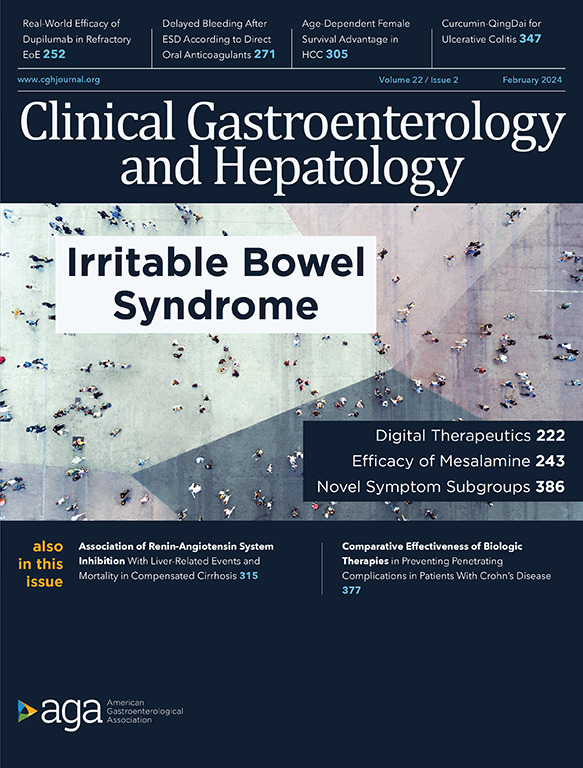The Cost of Inflammatory Bowel Disease Care: How to Make it Sustainable
IF 11.6
1区 医学
Q1 GASTROENTEROLOGY & HEPATOLOGY
引用次数: 0
Abstract
The rising global prevalence of inflammatory bowel diseases (IBDs), such as Crohn’s disease and ulcerative colitis, underscores the need to examine current and future IBD care costs. Direct health care expenses, including ambulatory visits, hospitalizations, and medications, are substantial, averaging $9,000 to $12,000 per person annually in high-income regions. However, these estimates do not fully account for factors such as disease severity, accessibility, and variability in health care infrastructure among regions. Indirect costs, predominantly stemming from loss in productivity due to absenteeism, presenteeism, and other intangible costs, further contribute to the financial burden of IBD. Despite efforts to quantify indirect costs, many aspects remain poorly understood, leading to an underestimation of their actual impact. Challenges to achieving cost sustainability include disparities in access, treatment affordability, and the absence of standardized cost-effective care guidelines. Strategies for making IBD care sustainable include early implementation of biologic therapies, focusing on cost-effectiveness in settings with limited resources, and promoting the uptake of biosimilars to reduce direct costs. Multidisciplinary care teams leveraging technology and patient-reported outcomes also hold promise in reducing both direct and indirect costs associated with IBD. Addressing the increasing financial burden of IBD requires a comprehensive approach that tackles disparities, enhances access to cost-effective therapeutics, and promotes collaborative efforts across health care systems. Embracing innovative strategies can pave the way for personalized, cost-effective care accessible to all individuals with IBD, ensuring better outcomes and sustainability.
IBD 护理的成本--如何使其可持续发展。
克罗恩病(CD)和溃疡性结肠炎(UC)等炎症性肠病(IBD)在全球的发病率不断上升,这凸显了研究当前和未来 IBD 护理成本的必要性。包括门诊就医、住院治疗和药物在内的直接医疗费用十分可观,在高收入地区平均每人每年为 9,000 到 12,000 美元。然而,这些估算并未充分考虑疾病的严重程度、可及性以及不同地区医疗基础设施的差异等因素。间接成本主要来源于缺勤、旷工造成的生产力损失以及其他无形成本,它们进一步加重了 IBD 的经济负担。尽管人们努力量化间接成本,但对许多方面仍然知之甚少,导致对其实际影响的低估。实现成本可持续性所面临的挑战包括就医机会的差异、治疗费用的可负担性以及缺乏标准化的具有成本效益的护理指南。使 IBD 护理可持续发展的策略包括尽早实施生物疗法,在资源有限的情况下注重成本效益,以及促进生物仿制药的使用以降低直接成本。利用技术和患者报告结果的多学科护理团队也有望降低与 IBD 相关的直接和间接成本。要解决 IBD 带来的日益沉重的经济负担,就必须采取综合措施,消除差异,提高成本效益疗法的可及性,并促进医疗保健系统之间的合作。采用创新策略可以为所有 IBD 患者提供个性化、具有成本效益的治疗铺平道路,从而确保更好的治疗效果和可持续性。
本文章由计算机程序翻译,如有差异,请以英文原文为准。
求助全文
约1分钟内获得全文
求助全文
来源期刊
CiteScore
16.90
自引率
4.80%
发文量
903
审稿时长
22 days
期刊介绍:
Clinical Gastroenterology and Hepatology (CGH) is dedicated to offering readers a comprehensive exploration of themes in clinical gastroenterology and hepatology. Encompassing diagnostic, endoscopic, interventional, and therapeutic advances, the journal covers areas such as cancer, inflammatory diseases, functional gastrointestinal disorders, nutrition, absorption, and secretion.
As a peer-reviewed publication, CGH features original articles and scholarly reviews, ensuring immediate relevance to the practice of gastroenterology and hepatology. Beyond peer-reviewed content, the journal includes invited key reviews and articles on endoscopy/practice-based technology, health-care policy, and practice management. Multimedia elements, including images, video abstracts, and podcasts, enhance the reader's experience. CGH remains actively engaged with its audience through updates and commentary shared via platforms such as Facebook and Twitter.

 求助内容:
求助内容: 应助结果提醒方式:
应助结果提醒方式:


